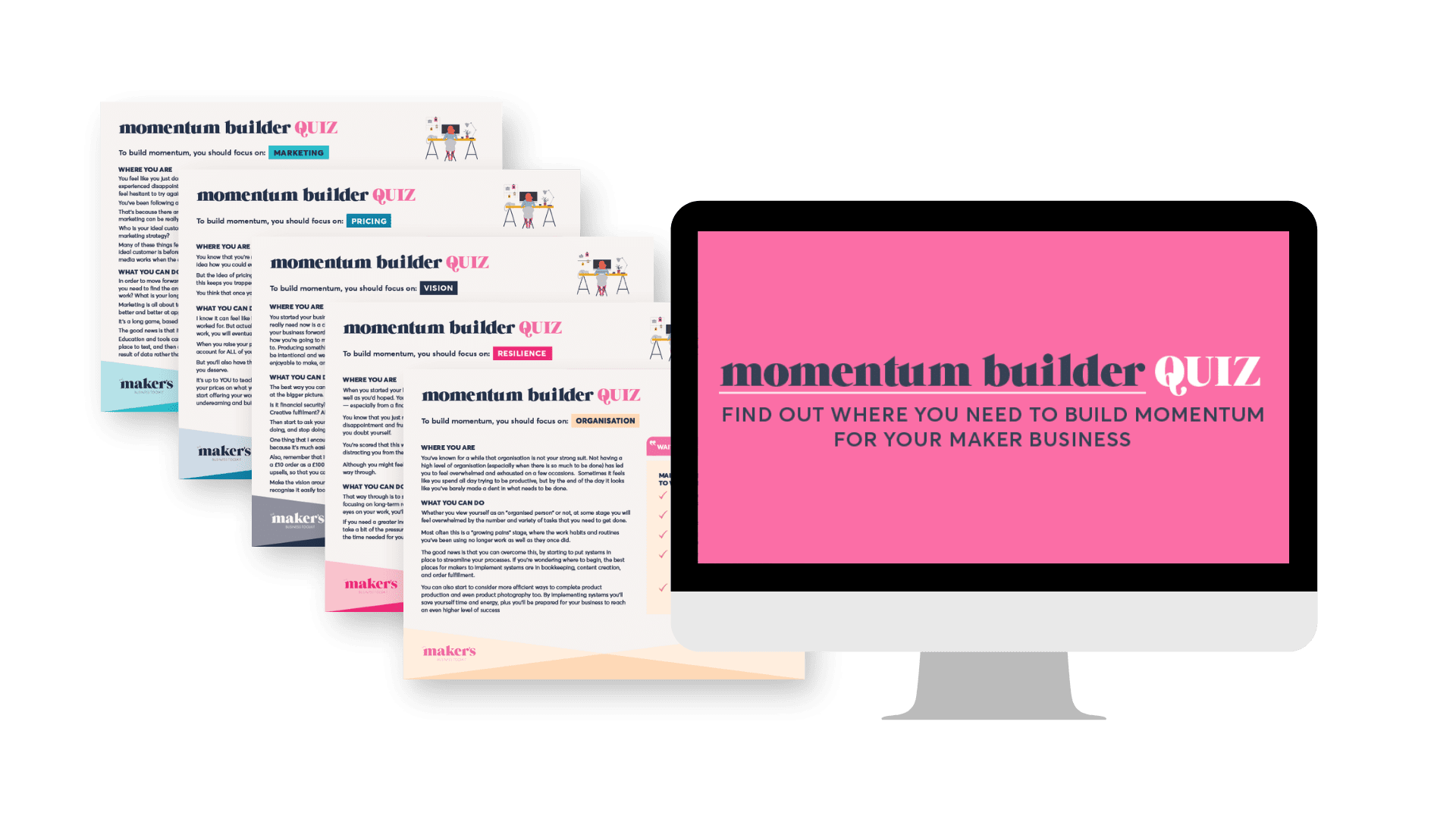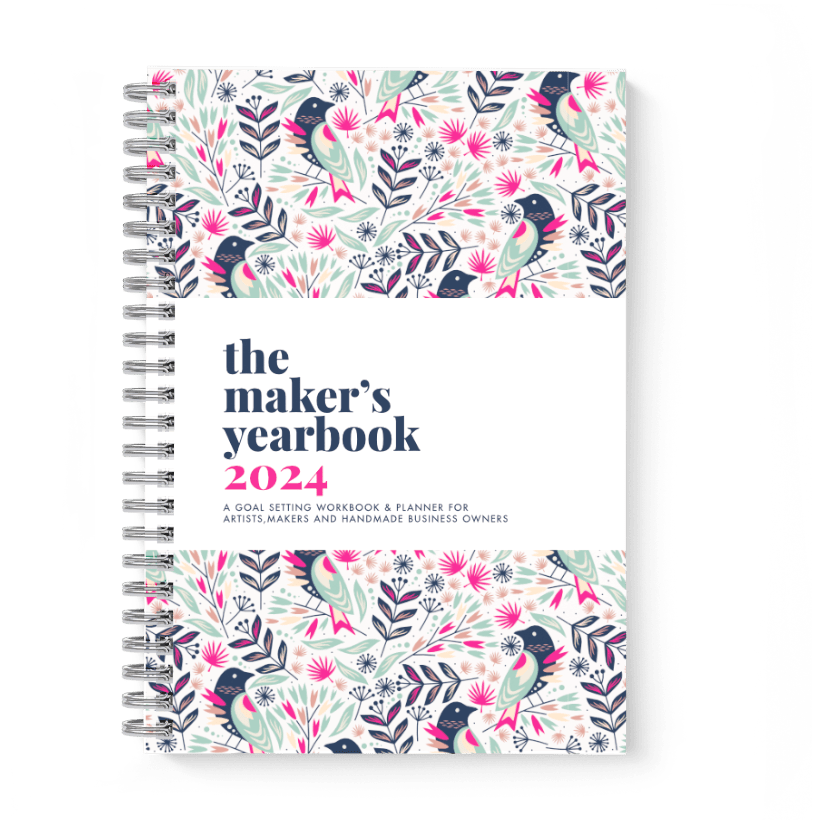It’s Monday night. The week has only just started and you’re feeling defeated already.
Why?
Because even though you did all of your planning for this week, and decided exactly what you were going to work on, Monday morning came along and ruined it all.
Maybe your kid got sick.
Maybe you got sick.
Maybe nursery is closed because everyone’s sick.
Maybe your grandmother had a fall and you spent the day in A&E with her.
Maybe the car broke down, or the boiler, or the freezer. Maybe someone cut the wrong cable and your broadband is down for (at least) the day.
Maybe your boss from your other job called and said that they needed you in today.
Whether it’s one day a week, or it feels this way every single day, at some point we will all experience the frustration of our plans falling apart almost as soon as we’ve made them.
For makers, a lot of the time we are often juggling running our business alongside family commitments, health conditions and other employment, which makes it that much more likely that one of these things will derail us on any given day.
So what can we do? Should we even bother planning our time in the first place?
Should we just wait for things to calm down or for life to be less complicated?
It’s a tough question to answer and everyone’s personal circumstances are different but if we just wait for things to get better, we might be waiting a long time.
There are some circumstances where all you can do is surrender and say “I’ve just got to get through this first” but for most of us, most of the time, the desire to wait for a better time is a mindset issue.
Of course the interruptions are very real and the frustration we feel about them is also very real.
But the temptation to wait until things are calmer, better, more settled? I think that’s perfectionism at work.
Artists and makers are notorious perfectionists. In fact, we’re often taught that it’s the mark of a “good” artist.
Art school teaches us to care deeply about every single square centimetre of our work, and to monitor production and reproduction incredibly closely to ensure that our work is presented just as we’d like it to be.
It’s really important to make the best work you can. But it’s also important to know when to let go and put it out into the world, knowing that although it’s not perfect, it’s what you can do with the skill and techniques available to you right now.
That’s the balance between diligence and giving yourself a break. Too much diligence and we can fall into perfectionism and comparison. Too much giving ourselves a break and we may not do our best work.
When it comes to managing our time, we need a similar approach. A balance between making our best efforts and giving ourselves a break about things that are beyond our control.
And I actually think it goes further than that too.
I think that when it comes to planning and managing our time, we need to expect the unexpected, and account for it in the way we do our planning.
We know that planning is only helpful if it enables us to achieve more of the things we want to achieve. That’s why it seems pointless when things are unpredictable and we’re tempted to just dive in and do what we can.
But maybe we should try a different approach to planning instead.
What if, instead of figuring out how to spend the hours on our calendar, we were using our planning as a tool to remember what is most important to us? A tool that could help us get back on track quickly after an interruption.
After all, how much of the time that is wasted in your business is wasted because of the interruptions themselves, and how much is wasted because you forget what you’re supposed to be doing and end up mindlessly scrolling or panicking about what you’re not doing?
We stop planning because we expect it to work perfectly.
We stop planning because we want it to prevent the interruptions.
But that’s getting it backwards. Planning gives you something to work towards and something to hold on to when things are tough.
And, yes, it’s frustrating to have to look at something you wanted to happen and adjust the timescale for it again and again and again.
It feels like failure, but actually it’s growth. It’s teaching you to adapt to the demands of your life, to set boundaries when you need to, and to be resilient and adaptable.
To think about what you can do, even with the interruptions. And that’s a much healthier place to be in.
So how can you get back on track after an interruption has stopped you from sticking to your plans?
1. Adjust all of the timelines for your plan.
Don’t try to catch up. Wipe the slate clean and start from where you are today.
We can’t ever catch up unless we sacrifice something else and the reason we’re in this situation is that our time is pretty much all spoken for.
When the work to achieve the goal just keeps getting bigger and bigger and bigger, and is stuffed into a less and less realistic timeframe, we’re making things so much harder than they need to be and almost guaranteeing we will end up feeling like the whole thing is impossible.
But we’re doing it to ourselves. Reset your timelines and your expectations and the work will feel so much more achievable.
Pro tip – don’t plan the timelines for your day to day tasks too far in advance. If you’ve got a lot of interruptions and disruption to your work right now then decide on your tasks for the day each morning. That way you’re not letting unfinished tasks pile up.
2. Don’t let disappointment get in the way
It’s easy to spend time feeling sorry for yourself when your plans are going to take longer than you expected – especially if it’s happened a few times.
But the lack of motivation that comes from being too attached to the timeline often causes more disruption than the interruptions themselves. Plus it wastes more time, so it’s actually making the problem worse.
Focus on doing the work when you can, as quickly as you can, and always stay mindful of the fact that most things are going to take quite a bit longer than you expect.
3. Don’t keep working when you’re burned out
When your project or goal has got behind because of outside interruptions, it can be tempting to “catch up” on the weekends, late at night or even in your holiday time.
And, while this can work short term, if you’re already burned out, you’ll probably benefit more from a short break to refill your energy reserves than you will on pushing through.
4. Make sure that your plans are written down
Think about how you feel on that first day when you start work after a holiday. Maybe after a week or two off in the summer, or maybe over Christmas and New Year.
When you sit down to work, you’ve pretty much got no idea what you should be working on.
Everything that seemed really important before your holiday is just gone from your brain. And you’re back to figuring it all out again.
Now imagine that this happened every time you got sick, or had to stop work to deal with a family crisis, or a busy period in your day job.
Because it does.
Every interruption makes us forget where we were. And it takes us time to get back into things.
Now imagine if, before you went on holiday, you wrote yourself a little report. It would set out which customer orders were in progress and where you were with them, what materials were getting low and needed to be monitored, what customer service questions were outstanding.
This would cover the day to day running of your business. But you should also be doing this with your big plans and vision for your business.
A tool like Maker’s Yearbook can help you to do this and create a record of the things that you’re working on, so that after every interruption you can quickly see where you were and get back to work.
Having things written down also allows you to make a judgment call when you might need to let something go.
When things go sideways you can take a look at your plan and decide if there are parts that could wait or that are “nice to have.”
5. Check on your boundaries
Sometimes there’s nothing we can do about the interruptions. But sometimes we could make things run a little smoother if we were willing to have some awkward conversations.
If we were willing to say no more often.
If we were willing to ask for more help.
If we were willing to remind family members about our work hours.
If we were willing to let things be a little uncomfortable for other people.
If we were willing to let people wait a little while for things.
If you’re getting interrupted a lot, it’s time to take a good look at your boundaries and whether you’ve been clear with the people in your life about what you need and what you can and cannot do for them.
Boundaries are difficult and we can find it hard to stop people pleasing but planning can also help you to see where things need to change.
When you have to reset your plans over and over and over again and you look at the reasons why, you might find that there are some places where you could make a change.
The bottom line is that getting off track is the rule, not the exception
We need to leave space in our plans for interruptions, disruption and sometimes even weeks or more where we don’t make progress towards our goals.
Planning is about where we want to go. And although timelines and targets are often motivating, we shouldn’t let our plans become all about controlling time.
We cannot control what happens but if we can continue to work mindfully and purposefully and with a flexible approach, we can still work towards the things that we want the most.









